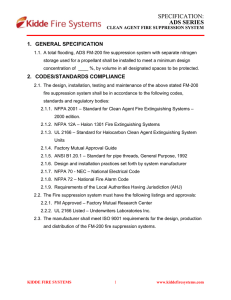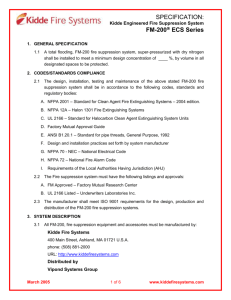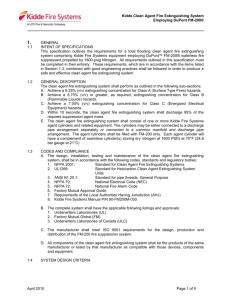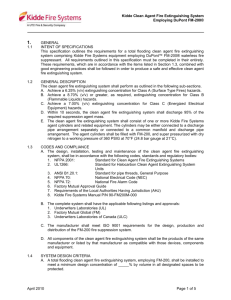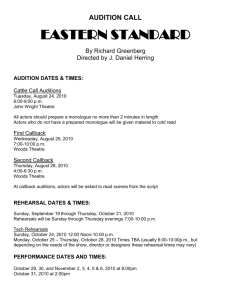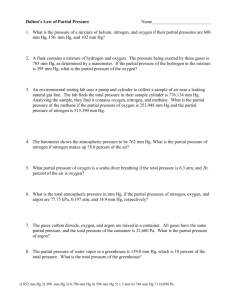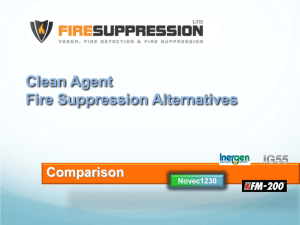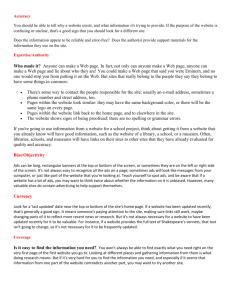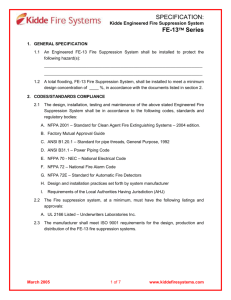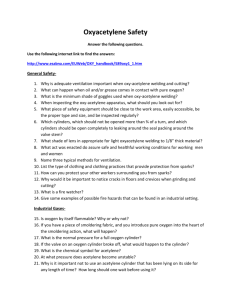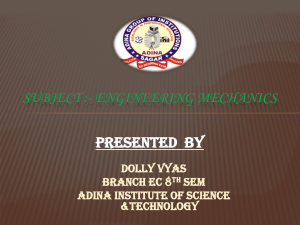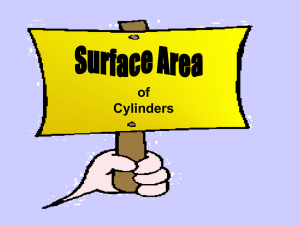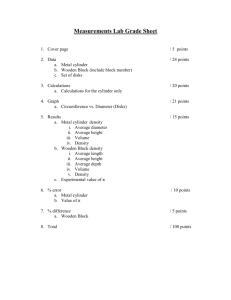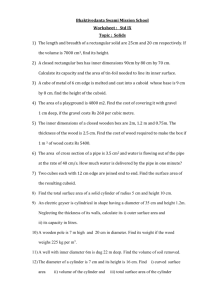KIDDE_FM-200_ADS - Canadian Fire Alarm Association
advertisement
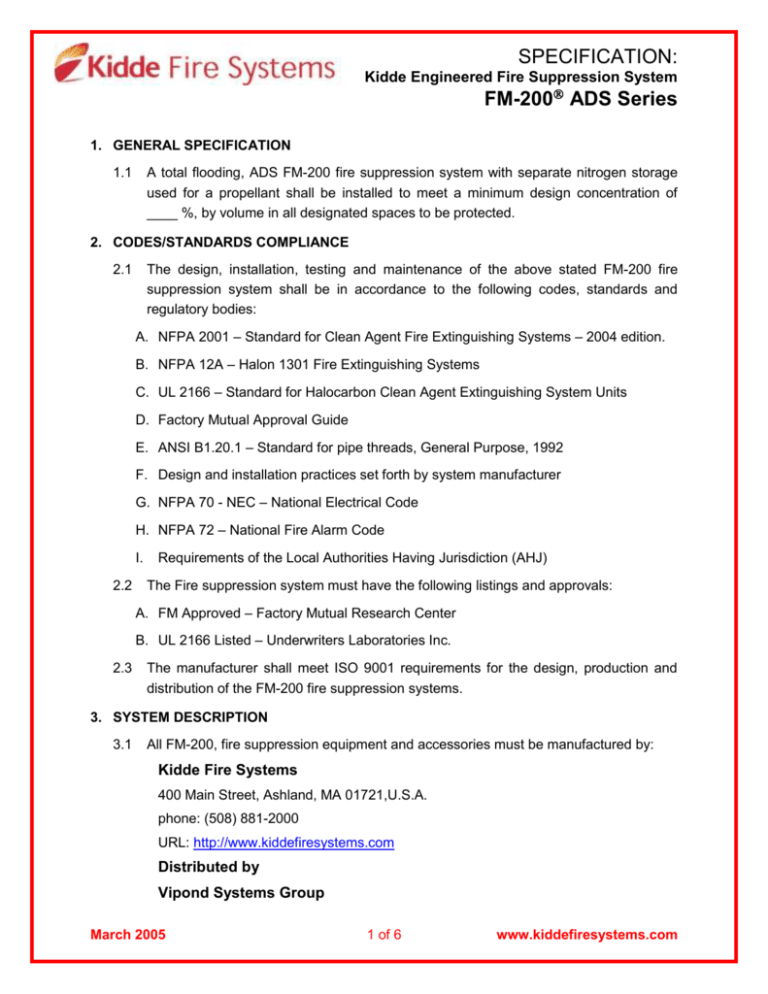
SPECIFICATION: Kidde Engineered Fire Suppression System FM-200 ADS Series 1. GENERAL SPECIFICATION 1.1 A total flooding, ADS FM-200 fire suppression system with separate nitrogen storage used for a propellant shall be installed to meet a minimum design concentration of ____ %, by volume in all designated spaces to be protected. 2. CODES/STANDARDS COMPLIANCE 2.1 The design, installation, testing and maintenance of the above stated FM-200 fire suppression system shall be in accordance to the following codes, standards and regulatory bodies: A. NFPA 2001 – Standard for Clean Agent Fire Extinguishing Systems – 2004 edition. B. NFPA 12A – Halon 1301 Fire Extinguishing Systems C. UL 2166 – Standard for Halocarbon Clean Agent Extinguishing System Units D. Factory Mutual Approval Guide E. ANSI B1.20.1 – Standard for pipe threads, General Purpose, 1992 F. Design and installation practices set forth by system manufacturer G. NFPA 70 - NEC – National Electrical Code H. NFPA 72 – National Fire Alarm Code I. 2.2 Requirements of the Local Authorities Having Jurisdiction (AHJ) The Fire suppression system must have the following listings and approvals: A. FM Approved – Factory Mutual Research Center B. UL 2166 Listed – Underwriters Laboratories Inc. 2.3 The manufacturer shall meet ISO 9001 requirements for the design, production and distribution of the FM-200 fire suppression systems. 3. SYSTEM DESCRIPTION 3.1 All FM-200, fire suppression equipment and accessories must be manufactured by: Kidde Fire Systems 400 Main Street, Ashland, MA 01721,U.S.A. phone: (508) 881-2000 URL: http://www.kiddefiresystems.com Distributed by Vipond Systems Group March 2005 1 of 6 www.kiddefiresystems.com SPECIFICATION: Kidde Engineered Fire Suppression System FM-200 ADS Series 3.2 The manufacturer shall warrant all FM-200, fire suppression system products for 36 months from date of shipment or one (1) full year from the date of installation. 3.3 The system shall be supplied and installed by a factory-authorized, Kidde Fire Systems distributor. The distributor / Installer shall be trained by the manufacturer to calculate / design, install, test and maintain the ADS, FM-200 Fire suppression system and shall be able to produce a certificate stating such on request. 3.4 The ADS system shall consist of a Kidde FM-200 Agent Storage Cylinder, Kidde Nitrogen Driver Cylinder, Kidde Nitrogen Transfer hardware, Kidde actuation hardware and Kidde ADS system distribution nozzles attached to a pipe network. 3.5 (OPTIONAL EQUIPMENT) The FM-200 Agent Cylinder shall have the option of a Liquid level indicator. This device will provide a reliable means other than weighing for determining the agent weight with the storage container during normal routine servicing. 4. COMPONENTS 4.1 FM-200 Cylinder and Valve Assembly A. FM-200 shall be stored in a Kidde ADS series Cylinders P/N 90-10022X-001 or 9010039X-001. Operating pressure of the FM-200 shall be at 44 psig @ 70F. B. FM-200 Agent cylinders can be actuated pneumatically with Kidde P/N 878737. C. The FM-200 Agent cylinder shall be provided with a safety rupture disc. 4.2 Nitrogen Driver Cylinder and Valve Assembly A. Nitrogen shall be stored in a Kidde ADS series Nitrogen driver cylinder P/N 90102300-001 for use with agent storage cylinder 90-10022X-001 B. Nitrogen shall be stored in a Kidde ADS series Nitrogen driver cylinder P/N 90104070-001 for use with agent storage cylinder 90-10039X-001 C. Operating Pressure for Nitrogen driver cylinders, P/N 90-102300-001 and 90104070-001 shall be 1800 psig @ 70F. D. Nitrogen driver cylinders shall be equipped with a discharge head, Kidde P/N 872442 and shall be actuated as the primary cylinder using a Kidde electric control head, electric / cable control head or lever operated control head. E. (OPTIONAL EQUIPMENT): pneumatic actuation of Nitrogen driver cylinders can be accomplished by using a nitrogen pilot Cylinder Kidde P/N’s 877940 or 06-12977300X March 2005 2 of 6 www.kiddefiresystems.com SPECIFICATION: Kidde Engineered Fire Suppression System FM-200 ADS Series 4.3 Nitrogen Driver Transfer Hardware A. Nitrogen shall be transferred from the Nitrogen Driver Cylinder to the FM-200 Agent cylinder by using a ¾” Outlet, flexible transfer hose. Kidde P/N 06-118207-00X. B. Nitrogen Transfer to the FM-200 Agent cylinder shall be regulated by an Orifice fitting, Kidde P/N 90-194129-XXX. Size of Orifice restrictor plate to be determined using Kidde ADS flow calculation software P/N 90-190002-100. 4.4 Distribution Nozzles A. Engineered discharge nozzles for use with the Kidde ADS series system will be made of Brass or Stainless steel, Kidde P/N 90-1944XX-XXX B. Each nozzle shall be located in the space per the manufacturers guidelines, Nozzles can have either a 180 or a 360-degree discharge pattern. A. Each Nozzle discharge pattern shall be available in sizes ranging from ½” NPT to 2” NPT. C. (OPTIONAL EQUIPMENT): Nozzle escutcheon plates can be used to conceal pipe entry through ceiling, Kidde P/N 06-23613X-001 4.5 Pipe Network A. Distribution piping, and fittings, shall be installed in accordance with NFPA 2001, approved piping standards and FM-200 system manufacturer’s requirements. 4.6 (OPTIONAL EQUIPMENT) 3-Way Directional Ball Valves A. For selector suppression systems were multiple hazard manifold arrangements are used, a Kidde 3-Way directional ball valve for use with the ADS series system shall be used. P/N 90-22003X-00X. B. When multiple cylinders are used, each cylinder must have the same orifice fitting and drill size and be of the same cylinder size and fill density to ensure proper regulated flow of agent and nitrogen. C. 3-way directional ball valves shall be pneumatically actuated using a Kidde nitrogen pilot cylinder P/N 877940 or 06-129773-00X. D. The fire system control panel will energize an electric solenoid P/N 06-118384-001 attached to the actuator, allowing pressure to enter the actuator and turn the selected 3-way ball valve, 90 deg CCW. March 2005 3 of 6 www.kiddefiresystems.com SPECIFICATION: Kidde Engineered Fire Suppression System FM-200 ADS Series E. The 3-way directional ball valves shall be installed and located in the piping network per the manufacturers guidelines and design manual F. 3-Way directional ball valves must be UL system listed with the Kidde ADS. 5. SUBMITTALS 5.1 Engineered Design Drawings A. The factory-authorized Kidde Fire Systems Distributor shall provide all required installation drawings per NFPA 2001. 5.2 Flow Calculation Reports A. The contractor shall provide the following information in the flow calculation report. 1. Customer Information and Project Data 2. Enclosure Information – at a minimum, enclosure information is to include Minimum and adjusted design concentrations, Minimum and maximum enclosure temperatures, minimum agent required and volume of enclosures, including nonpermeable volume if applicable. 3. Agent information – at a minimum, agent information is to include Cylinder size and part number, quantity of cylinders, main and / or reserve cylinders, pipe take off direction, floor loading for agent cylinder and the nitrogen restrictor plate orifice area. 4. Pipe network information – at a minimum, pipe network information is to include pipe type, pipe diameter, pipe length, change in direction or elevation, pipe equivalent length and any added accessory equivalent length. In addition, the following nozzle information shall be provided; number of nozzles and identification of enclosure location, flow rate of associated nozzle, nozzle nominal size, nozzle type and nozzle orifice area. 5. (OPTIONAL) 3-way ball valve information – A calculation must be completed for each directional valve in the piping network. Modeling of the 3-Way ball valve must be shown in the ”opened” and “closed” position. 6. Detailed list of all Pipes and Pipe Fittings designed in the pipe network March 2005 4 of 6 www.kiddefiresystems.com SPECIFICATION: Kidde Engineered Fire Suppression System FM-200 ADS Series 5.3 Commissioning Equipment List A. The contractor shall provide a commissioning equipment list for each installed FM200 suppression system. The equipment list shall identify all installed equipment and configurations. 5.4 Test Plan A. The contractor / Installer shall submit a test plan which describes how the system equipment and room integrity shall be tested. This shall include a step-by-step description of all tests and shall indicate type and location of test apparatus to be used. At a minimum, the tests to be conducted shall be per NFPA 2001 and any additional supplemental tests required by the AHJ. Tests shall not be scheduled or conducted until the engineer of record approves the test plan. 5.5 Installation Drawings A. Four (4) sets of installation drawings for each installed FM-200 suppression system and One (1) set of the calculation report, owners manual and product data sheets shall be submitted to the end-user / owner. B. Upon completion of installation and commissioning acceptance, two (2) sets of “AsBuilt” installation drawings and One (1) set of the calculation report for each installed FM-200 suppression system shall be given to the owner / end-user for use and reference. 5.6 Operation and Maintenance Manuals A. Two (2) copies of the Kidde ADS FM-200 fire suppression system, Operation and Maintenance Manual shall be submitted after complete installation. 6. SYSTEM INSTALLATION AND COMMISSIONING 6.1 FM-200 Fire Suppression System Equipment A. All work shall be completed in a high degree of workmanship and in compliance with the above referenced codes and standards. In addition, the contractor shall install the system in accordance with the manufacturer’s installation, operation and maintenance manual. 6.2 Training Requirements A. The contractor shall be certified and trained by the manufacturer on installation, design and maintenance of the Kidde ADS, FM-200 fire suppression systems. March 2005 5 of 6 www.kiddefiresystems.com SPECIFICATION: Kidde Engineered Fire Suppression System FM-200 ADS Series 6.3 Routine Maintenance 1. Routine maintenance shall be performed as recommended by the manufacturer’s installation, operation and maintenance manual. At a minimum, the routine maintenance will include the following: 2. Visual Check of Pipe network and distribution nozzles per the operation and maintenance manual. 3. Weight of FM-200 Agent cylinder and pressure of Nitrogen driver cylinder per the operation and maintenance manual. 4. Inspect all cylinders and equipment for damage per the operation and maintenance manual. 5. Pneumatic operation of 3-way directional valve. March 2005 6 of 6 www.kiddefiresystems.com
